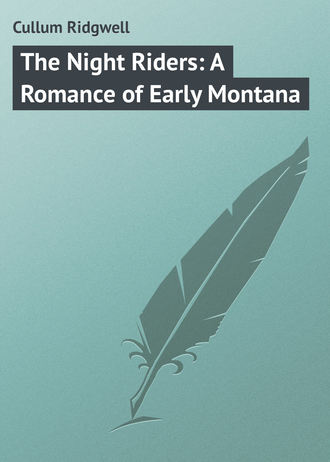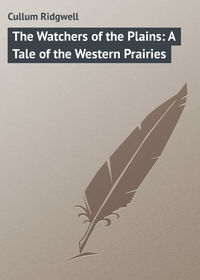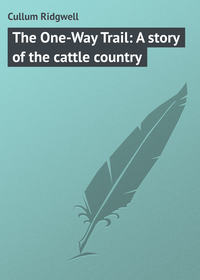 полная версия
полная версияThe Night Riders: A Romance of Early Montana
“I ain’t gifted wi’ imagination. Y’ ain’t never sure which way a blind mule’s likely ter kick. Jake’s in the natur’ of a blind mule. What I sez is, watch him. Don’t look east when he’s west. Say,” he went on, in a tone of disgust, “you Noo Yorkers make me sick. Ther’ ain’t nothin’ ter hittin’ a feller an’ makin’ him sore. It on’y gives him time to git mad. A gun’s handy an’ sudden. On’y you need a goodish bore ef you’re goin’ ter perf’rate the hide of a guy like Jake. Pshaw!” he finished up witheringly, “you fellers ain’t got shut o’ last century.”
“Maybe we haven’t,” Tresler retorted, with a good-humored laugh; “but your enterprise has carried you so far ahead of time that you’ve overlapped. I tell you, man, you’re back in the savage times. You’re groping in the prehistoric periods – Jurassic, Eocene, or some such.”
“Guess I ain’t familiar wi’ Jurassics an’ Eocenes,” Arizona replied gravely. “Mebbe that was before my time; but ef you’re speakin’ o’ them fellers as clumped each other over the head wi’ stone clubs, I ’lows they had more savee than a Noo Yorker, ef they wus kind o’ primitive in the’r habits.”
Tresler accepted the argument in the spirit in which it was put forward. It was no use getting angry. Arizona was peculiar, but he had reason to consider him, in his own parlance, “a decent citizen.” He went on with his work steadily while the cowpuncher grunted out his impatience. Then at last, as though it were forced from him, the latter jerked out a more modified opinion of the civilized American. It seemed as though Tresler’s very silence had drawn it from him.
“Wal,” he said grumblingly, “mebbe you Noo Yorkers has points – mebbe, I sez.” Then he dismissed the subject with an impatient shrug of his drooping shoulders, and went off at a fresh angle. “Say, I wus kind o’ wonderin’ some ’bout that flea-bitten shadder, Joe Nelson. He’s amazin’ queer stayin’ ’round here. He’s foxin’ some, too. Y’ ain’t never sure when you’re like to strike them chewed-up features o’ his after nightfall. Y’ see he’s kind o’ quit drinkin’ – leastways, he’s frekent sober. Mebbe he can’t sleep easy. Ther’s suthin’ worritin’ his head, sure. He ’pears ter me desp’rate restless – kind o’ like an old hoss wi’ the bush-ticks. Et don’t fit noways wi’ the Joe Nelson I oncet knew. Mebbe it’s religion. Ther’ ain’t nuthin’ like religion fer makin’ things oneasy in your head. Joe allus had a strain o’ religion in him.”
The Southerner gazed gloomily at the saddle on the fence, while he munched his tobacco in thoughtful silence.
“I don’t think Joe’s got religion,” said Tresler, with a smile. “He’s certainly worried, and with reason. Jake’s got his knife into him. No, I think Joe’s got a definite object in staying around here, and I shouldn’t wonder if he’s clever enough to attain it, whatever it is.”
“That sounds more like Joe,” assented the other, cheering up at the suggestion. “Still, Joe allus had a strain o’ religion in him,” he persisted. “I see him drop a man in his tracks oncet, an’ cry like a noo-born babby ’cos ther’ wa’n’t a chu’ch book in Lone Brake Settlement, an’ he’d forgot his prayers, an’ had ter let the feller lie around fer the coyotes, instead o’ buryin’ him decent. That’s a whiles ago. Guess Lone Brake’s changed some. They do say ther’s a Bible ther’ now. Kind o’ roped safe to the desk in the meetin’-house, so the boys can’t git foolin’ wi’ it. Yup,” he went on, with an abstracted look in his expressive eyes, “religion’s a mighty powerful thing when it gits around. Most like the fever. I kind o’ got touched wi’ it down Texas way on the Mexican border. Guess et wer’ t’ do wi’ a lady I favored at the time; but that ain’t here nor there. Guess most o’ the religion comes along o’ the wimmin folk. ’Longside o’ wimmin men is muck.”
Tresler nodded his appreciation of the sentiment.
“Gettin’ religion’s most like goin’ on the bust. Hits yer sudden, an’ yer don’t git off’n it easy. The signs is allus the same. You kind o’ worry when folks gits blasphemin’, an’ you don’t feel like takin’ a hand to help ’em out. You hate winnin’ at ‘draw,’ an’ talks easy when a feller holds ‘fours’ too frekent. An’ your liquor turns on your stummick. They’re all signs,” he added expansively. “When a feller gits like that he’d best git right off to the meetin’-house. That’s how I tho’t.”
“And you went?”
“That’s so. Say, an’ it ain’t easy. I ’lows my nerve’s pretty right fer most things, but when you git monkeyin’ wi’ religion it’s kind o’ different. ’Sides, ther’s allus fellers ter choke you off. Nassy Wilkes, the s’loon-keeper, he’d had religion bad oncet, tho’ I ’lows he’d fergot most o’t sence he’d been in the s’loon biz; he kind o’ skeered me some. Sed they used a deal o’ water, an’ mostly got ducking greenhorns in it. Wal, I put ha’f a dozen slugs o’ whisky down my neck – which he sed would prevent me gittin’ cold, seein’ water wa’n’t in my line – an’ hit the trail fer the meetin’.”
“What denomination?” asked Tresler, curiously. “What religion?” he added, for the man’s better understanding.
“Wal, I don’t rightly knows,” Arizona went on gravely. “I kind o’ fancy the boys called ’em ‘dippers’; but I guess this yarn don’t call fer no argyment,” he added, with a suspicion of his volcanic temper rising at the frequent interruptions. Then, as the other kept silence, he continued in his earnest way, “Guess that meetin’-house wus mostly empty. Ther’ wus one feller ther’ a’ready when I come. He wus playin’ toons on a kind o’ ’cordian he worked wi’ his feet – ”
“Harmonium,” suggested Tresler, diffidently.
“That’s it. I could ’a’ wep’ as I looked at that feller, he wus that noble. He’d long ha’r greased reg’lar, an’ wore swaller-tails. Guess he wus workin’ that concertina-thing like mad; an’ he jest looked right up at the ceilin’ as if he wer’ crazy fer some feller to come ’long an’ stop him ’fore he bust up the whole shootin’ match.”
“Looked inspired,” Tresler suggested.
“Mebbe that’s wot. Still, I wus glad I come. Then the folks come along, an’ the deac’n; an’ the feller quit. Guess he wus plumb scart o’ that deac’n, tho’ I ’lows he wus a harmless-lookin’ feller ’nough. I see him clear sheer out o’ range on sight, which made me think he wus a mean-sperrited cuss anyway.
“Yes, I guess I wus glad I’d come; I felt that easy an’ wholesome. Say, the meetin’s dead gut stuff. Yes, sir – dead gut. I felt I’d never handle a gun again; I couldn’t ’a’ blasphemed ’longside a babby ef you’d give me ten dollars to try. An’ I guess ther’ wa’n’t no dirty Greaser as I couldn’t ha’ loved like a brother, I wus that soothed, an’ peaceful, an’ saft feelin’. I jest took a chaw o’ plug, an’ sat back an’ watched them folks lookin’ so noble as they come along in the’r funeral kids an’ white chokers. Then the deac’n got good an’ goin’, an’ I got right on to the ‘A-mens,’ fetchin’ ’em that easy I wished I’d never done nothin’ else all my life. I set ther’ feelin’ real happy.”
Arizona paused, and his wild eyes softened as his thoughts went back to those few happy moments of his chequered career. Then he heaved a deep sigh of regret and went on —
“But it wa’n’t to last. No, sir, religion ain’t fer the likes o’ me. Ye can’t play the devil an’ mix wi’ angels. They’re bound to out you. Et’s on’y natteral. Guess I’d bin chawin’ some, an’ ther’ wa’n’t no spit boxes. That’s wher’ the trouble come. Ther’ wus a raw-boned cuss wi’ his missis settin’ on the bench front o’ me, an’ I guess her silk fixin’s got mussed up wi’ t’bacca juice someways. I see her look down on the floor, then she kind o’ gathered her skirts aroun’ her an’ got wipin’ wi’ her han’k’chief. Then she looks aroun’ at me, an’, me feelin’ friendly, I kind o’ smiled at her, not knowin’ she wus riled. Then she got whisperin’ to her wall-eyed galoot of a man, an’ he turns aroun’ smart, an’ he sez, wi’ a scowl, sez he, ‘The meetin’-house ain’t no place fer chawin’ hunks o’ plug, mister; wher’ wus you dragged from?’ Ther’ wus a nasty glint to his eye. But ef he wus goin’ to fergit we wus in the meetin’-house I meant showin’ him I wa’n’t. So I answers him perlite. Sez I, wi’ a smile, ‘Sir,’ sez I, ‘I take it we ain’t from the same hog trough.’ I see he took it mean, but as a feller got up from behind an’ shouts ‘Silence,’ I guessed things would pass over. But that buzzard-headed mule wus cantankerous. He beckons the other feller over an’ tells him I wus chawin’, an’ the other feller sez to me: ‘You can’t chaw here, mussin’ up the lady’s fixin’s.’
“Wal, bein’ on’y human, I got riled, but, not wishin’ to raise a racket, I spat my chew out. I don’t know how it come, but, I guess, bein’ riled, I jest didn’t take notice wher’ I dumped it, till, kind o’ sudden-like, I found I wus inspectin’ the vitals o’ that side-show-freak’s gun. Sez he, in a nasty tone, which kind o’ interrupted the deac’n’s best langwidge, an’ made folks fergit to fetch the ‘A-men’ right, ‘You dog-gone son of a hog – ’ But I didn’t wait fer no more. I sees then what’s amiss. My chaw had located itself on the lady’s ankle – which I ’lows wus shapely – which she’d left showin’ in gatherin’ her fixin’s aroun’ her. I see that, an’ I see his stovepipe hat under the seat. I jest grabbed that hat sudden, an’ ’fore he’d had time to drop his hammer I’d mushed it down on his head so he couldn’t see. Then I ups, wi’ the drop on him, an’ I sez: ‘Come right along an’ we’ll settle like honest cit’zens.’ An’ wi’ that I backed out o’ the meetin’. Wal, I guess he wus clear grit. We settled. I ’lows he wus a dandy at the bizness end o’ a gun, an’ I walked lame fer a month after. But ther’ was a onattached widdy in that town when we’d done.”
“You killed him?” Tresler asked.
“Wal, I didn’t wait to ast no details. Guess I got busy fergittin’ religion right off. Mebbe ther’s a proper time fer ev’rything, an’ I don’t figger it’s reas’nable argyfyin’ even wi’ a deac’n when his swaller-tail pocket’s bustin’ wi’ shootin’ materials. No, sir, guess religion ain’t no use fer me.”
Arizona heaved a deep sigh of regret. Tresler gathered up his saddle and bridle. Once or twice he had been ready to explode with laughter during his companion’s story, but the man’s evident sincerity and earnestness had held him quiet; had made him realize that the story was in the nature of a confidence, and was told in no spirit of levity. And, somehow, now, at the end of it, he felt sorry for this wandering outcast, with no future and only a disreputable past. He knew there was far more real good in him than bad, and yet there seemed no possible chance for him. He would go on as he was; he would “punch” cattle so long as he could find employment. And when chance, or some other matter, should plunge him on his beam ends, he would take to what most cowboys in those days took to when they fell upon evil days – cattle-stealing. And, probably, end his days dancing at the end of a lariat, suspended from the bough of some stout old tree.
As he moved to go, Arizona rose abruptly from his seat, and stayed him with a gesture.
“Guess I got side-tracked yarnin’. I wanted to tell you a few things that’s bin doin’ sence you’ve bin away.”
Tresler stood.
“Say,” the other went on at once, “ther’s suthin’ doin’ thick ’tween Jake an’ blind hulks. Savee? I heerd Jake an’ Miss Dianny gassin’ at the barn one day. She wus ther’ gittin’ her bit of a shoe fixed by Jacob – him allus fixin’ her shoes for her when they needs it – an’ Jake come along and made her go right in an’ look at the new driver he wus breakin’ fer her. Guess they didn’t see me, I wus up in the loft puttin’ hay down. When they come in I wus standin’ takin’ a chaw, an’ Jake’s voice hit me squar’ in the lug, an’ I didn’t try not to hear what he said. An’ I soon felt good that I’d held still. Sez he, ‘You best come out wi’ me an’ learn to drive her. She’s dead easy.’ An’ Miss Dianny sez, sez she, ‘I’ll driv’ her when she’s thoroughly broken!’ An’ he sez, ‘You mean you ain’t goin’ out wi’ me?’ An’ she answers short-like, ‘No.’ Then sez he, mighty riled, ‘You shan’t go out with that mare by yourself to meet no Treslers,’ sez he. ‘I’ll promise you that. See? Your father’s on to your racket, I’ve seen to that. He knows you an’ him’s bin sparkin’, an’ he’s real mad. That’s by the way,’ he sez. ‘What I want to tell you’s this. You’re goin’ to marry me, sure. See? An’ your father’s goin’ to make you.’ An’ Miss Dianny jest laffed right out at him. But her laff wa’n’t easy. An’ sez she, wi’ mock ’nuff to make a man feel as mean as rank sow-belly, ‘Father will never let me marry, and you know it.’ An’ Jake stands quiet a minnit. Then I guess his voice jest rasped right up to me through that hay-hole. ‘I’m goin’ to make him,’ sez he, vicious-like. ‘A tidy ranch, this, eh? Wal, I tell you his money an’ his stock an’ his land won’t help him a cent’s worth ef he don’t give you to me. I ken make him lick my boots if I so choose. See?’ Ther’ wa’n’t another word spoke. An’ I heerd ’em move clear. Then I dropped, an’ pushin’ my head down through the hay-hole, I see that Jake’s goin’ out by hisself. Miss Dianny had gone out clear ahead, an’ wus talkin’ to Jacob.”
“What do you think it means?” asked Tresler, quietly.
And in a moment the other shot off into one of his volcanic surprises.
“I ain’t calc’latin’ the’r meanin’. Say, Tresler.” The man paused, and his great rolling eyes glanced furtively from right to left. Then he came close up and spoke in a harsh whisper. “It’s got to be. He ain’t fit to live. This is wot I wus thinkin’. I’ll git right up to his shack, an’ I’ll call him every son-of-a – I ken think of. See? He’ll git riled, an’ – wal, I owe her a debt o’ gratitood, an’ I can’t never pay it no other ways, so I’ll jest see my slug finds his carkis right, ’fore he does me in.”
Arizona stepped back with an air of triumph. He could see no flaw in his plan. It was splendid, subtle.
It was the one and only way to settle all the problems centering round the foreman. Thus he would pay off a whole shoal of debts, and rid Diane of Jake forever. And he felt positively injured when Tresler shook his head.
“You would pay her ill if you did that,” he said gravely. “Jake was probably only trying to frighten her. Besides, he is her father’s foreman. The man he trusts and relies on.”
“You ain’t got no savee,” Arizona broke out in disgust. “Say, he won’t need no foreman when Jake’s out of the way. You’ll marry the gal, an’ – ”
But he got no further. Tresler interrupted him coldly.
“That’s enough, Arizona. We aren’t going to discuss it further. In the meantime, believe me that I am wide awake to my position, and to Miss Marbolt’s, and ready to do the best for her in emergency. I must get on now, for I have several things to do before I turn in.”
Arizona had no more to say. He relapsed into moody silence, and, as they moved away together, Tresler was thankful for the freakish chance that had made this man come to him with his plan before putting it into execution. It was dark now, and as they reached the bunkhouse they parted. Tresler deposited his saddle at the barn, but he did not return to the bunkhouse. He meant to see Diane before he turned in, by hook or by crook.
He knew that the time had come when he must actively seek to help her. When Jake openly threatened her, and she was found weeping, there was certainly need of that help. He was alarmed, seriously alarmed, and yet he hardly knew what it was he feared most. He quite realized the difficulties that confronted him. She had given him no right to interfere in her affairs. More, she would have every reason to resent such interference. But, in spite of this, he held to his resolve. It was his love that urged him on, his love that overbore his scruples, his gravest apprehensions. He told himself that he had the right which every man has. The right to woo and win for himself the love he covets. It was for Diane to say “yea” or “nay,” not her father. There was no comfort she had been accustomed to, or even luxury, that he could not give her. There was no earthly reason why he should not try to win her. He vividly called to mind what Joe had suggested, and Arizona’s unfinished sentence rang in his ears, but both suggestions as a basis of hope he set aside with a lover’s egotism. What could these men know or understand of such a matter?
He had left the barn, and his way took him well out from the ranch yards in the direction of the pinewoods. He remembered his walk on his first night on the ranch, and meant to approach the back of the blind man’s house by the same route.
The calm of the prairie night had settled upon the ranch. The lowing of the cattle was hushed, the dogs were silent; and the voices of men and the tramp of horses’ hoofs were gone. There was only the harsh croaking of the frogs in the Mosquito River and the cry of the prowling coyote to disturb the peace of the summer night.
And as he walked, he felt for the first time something of the grip which sooner or later the prairie fixes upon those who seriously seek life upon its bosom. Its real fascination begins only when the first stages of apprenticeship to its methods and habits are passing. The vastness of its world, its silence, its profound suggestion of solitude, which ever remains even where townships and settlements exist, holds for man a fascination which appeals to the primitive senses and drags him back from the claims of civilization to the old, old life. And when that call comes, and the latent savage is roused from the depths of subjection, is it wonder that men yield to what, after all, is only the true human instinct – the right of the individual to defend itself from all attacks of foes? No; and so Tresler argued as he thought of the men who were his comrades.
Under the influence of his new feelings it seemed to him that life was so small a thing, on which folks of civilization set much too high a value. The ready appeal to the gun, which seemed to be one of the first principles of the frontiersman’s life, was already beginning to lose its repugnance for him. After all, where no arbitration could be enforced, men still had a right to defend self and property.
His thoughts wandered on through a maze of argument which convinced him notwithstanding he told himself that it was all wrong. He told himself weakly that his thoughts were the result of the demoralizing influence of lawless associates, but, in spite of this, he felt that there was, in reality, something in them of a deeper, more abiding nature.
He had made the woodland fringe, and was working his way back toward the house. The darkness was profound here. The dense, sad-foliaged pines dropped their ponderous boughs low about him as he passed, shielding him from all possible view from the ranch. And, even over the underlay of brittle cones, his moccasined feet bore him along in a silent, ghostly manner. It was the first time in his life he had been forced to steal upon anybody’s house like a thief in the night; but he felt that his object was more than sufficient justification.
Now he looked keenly for any sign of lights among the ranch buildings. The bunkhouse was in darkness, but Jake’s house was still lit up. However, this did not bother him much. He knew that the foreman was in the habit of keeping his lamp burning, even after retiring. Perhaps he read at night. The idea amused him, and he wondered what style of literature might appeal to a man of Jake’s condition of mind. But even as he watched, the light went out, and he felt more satisfied.
He reached a point on the edge of the forest opposite the barn. Then something brought him up with a start. Some unusual sound had caught his ear. It was the murmur of voices in the distance. Immediately his mind went back to his first night on the ranch, and he remembered Red Mask and his attendant horseman. Now he listened, peering hard into the darkness in the direction of the house, at the point whence the sound was proceeding. Whoever were talking they seemed to be standing still. The sound grew no louder, nor did it die away. His curiosity drew him on; and with cautious steps, he crept forward.
He tried to estimate how far the speakers were from the house. It seemed to him that they were somewhere in the neighborhood of the rancher’s private stable. But he could not be altogether sure.
Now, as he drew nearer, the voices became louder. He could distinctly hear the rise and fall of their tones, but still they were unrecognizable. Again he paused, this time for caution’s sake only. He estimated that he was within twenty-five yards of the stable. It would not be safe to go further. The steady murmur that reached him was tantalizing. Under ordinary circumstances he would have risked discovery and gone on, but he could not jeopardize his present object.
He stretched himself under the shelter of a low bush, and, strangely enough, recognized it as the one he had lain under on that memorable first night. This realization brought him a grim foreboding; he knew what he expected, he knew what was coming. And his foreboding was fulfilled within a few seconds of taking up his position.
Suddenly he heard a door close, and the voices ceased speaking. He waited almost breathlessly for the next move. It came. The crackling of pine cones under shod hoofs sounded sharply to his straining ears. It was a repetition of what had happened before. Two horsemen were approaching from the direction of the house. It was inevitable that his hand should go to his gun, and, as he realized his own action, he understood how surely the prairie instincts had claimed him. But he withdrew it quickly and waited, for he had no intention of taking action. It might be Red Mask. It probably was. But he had no intention of upsetting his present plans by any blind, precipitate attack upon the desperado. Besides, if Red Mask and Jake were one, then the shooting of him, in cold blood, in the vicinity of the ranch, would, in the eyes of the police, be murder. No story of his would convince a jury that the foreman of Mosquito Bend was a cattle-rustler.
A moment later the horses dimly outlined themselves. There were two of them, as before. But he could not see well, the woods seemed darker than before; and, besides, they did not pass so near to him. They went on like ghostly, silent shadows, only the scrunch of the cones underfoot told of their solidity.
He waited until the sound died out, then he rose quietly and pursued his way. But what he had just witnessed plunged his thoughts into a moody channel. The night-riders were abroad again, riding unchecked upon their desperate way, over the trail of murder and robbery they cut for themselves wherever they went. He wondered with dread who was to be victim to-night. He remembered Manson Orr and shuddered. He had a bitter feeling that he had acted wrongly in letting them pass unchallenged in spite of what reason and a cool judgment told him. His duty had been to investigate, but he also thought of a sad-faced girl, friendless and alone, weeping her heart out in the midst of her own home. And somehow his duty faded out before the second picture. And, as though to further encourage him, the memory of Joe Nelson’s words came to him suddenly, and continued to haunt him persistently.
“You’ll jest round that gal up into your own corrals, an’ set your own brand on her quick, eh?”
CHAPTER XII
THE RISING OF A SUMMER STORM
When the horsemen had passed out of hearing, Tresler still exerted the utmost caution. He had yet to pass the blind man’s room, and he knew that that individual’s hearing was something bordering on the marvelous, and, he argued, he must still be up, or, at least, awake. So he moved on with the lightest tread, with every sense alert; watchful alike for every unusual sound or movement. At the stable he paused and gently tried the door. It was fast. He put his ear to it and listened, and was forced to be content with the rattle of the collar chains, and the sound of the heavy-breathing animals within. He would have liked to investigate further, for the noise of the shutting door, he knew, had come from the stable, but it behooved him to refrain. It would be worse than useless to rouse the man, Anton, who slept over the stable. And there was no other means of ascertaining what had been going on.
He crept on; and now the shadowy outline of the house itself shut him off from the ranch. He cleared the danger zone of the rancher’s bedroom and reached the kitchen, where he met with a first disappointment. He was relieved and delighted to find that a light was still burning there; but his joy was dashed almost immediately by finding that the linen blind was down, and not a crack showed by which he could get a view of the room. He dared not go to the door until he had ascertained who was within, so he stood for a moment uncertain what to do. Then he suddenly remembered that the kitchen had another window on the far side of the lean-to. It would mean passing out into the open again; still, the darkness was such that the risk was reduced to a minimum.









